Women in STEM: 2020
March is Women's History Month, a time to celebrate the contributions women have made to society. Sigma Xi will participate by celebrating women's contributions to science, technology, engineering, and math (STEM). We asked female Sigma Xi members to share the resources that have helped them in their careers.
Abigail Amissah-Arthur
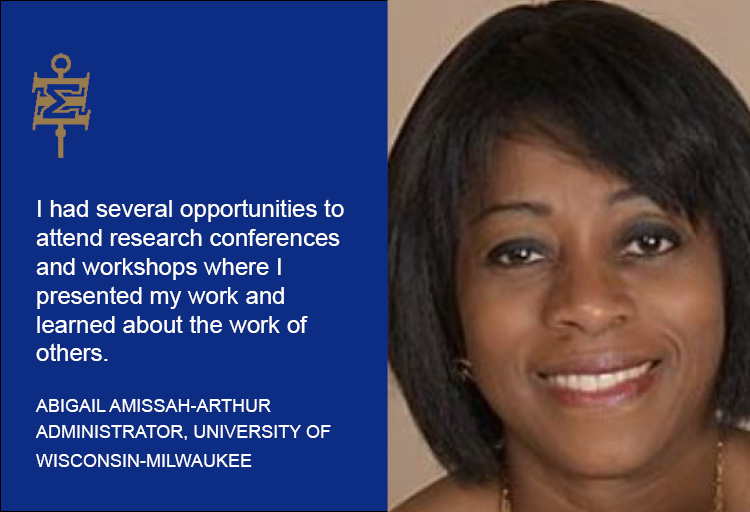
Current position
Director of the Office of Research Programs in the College of Health Sciences at the University of Wisconsin-Milwaukee
Please describe your job.
My position provides high-level support and advice on matters related to research infrastructure, research compliance, and funded & unfunded research in the College of Health Sciences. The position assumes a central role in annual planning and management of operations and services including the cultivation of research culture, building and establishment of collaborative research teams, promotion of organizational research accomplishments, and organization of research symposium and events for sharing and promotion of results of our scientific inquiries.
What are the top resources that have helped you in your career as a woman in STEM and why were they helpful?
I started my career as an environmental scientist with a focus on the impact of climatic variability, climate change on food production, and the application of climate prediction in decision making in agriculture. Over the years, I moved from a faculty and research scientist role into a full administrative role. I have been lucky to have had the opportunity earlier in my career to work with a number of famous scientists in my field. The interactions and mentoring that I received back then has been invaluable in building my own independent career. As a graduate student, I had several opportunities to attend research conferences and workshops where I presented my work and learned about the work of others. Many of my peers were not as fortunate as I to have had those experiences.
Marta Diez-Valcarce
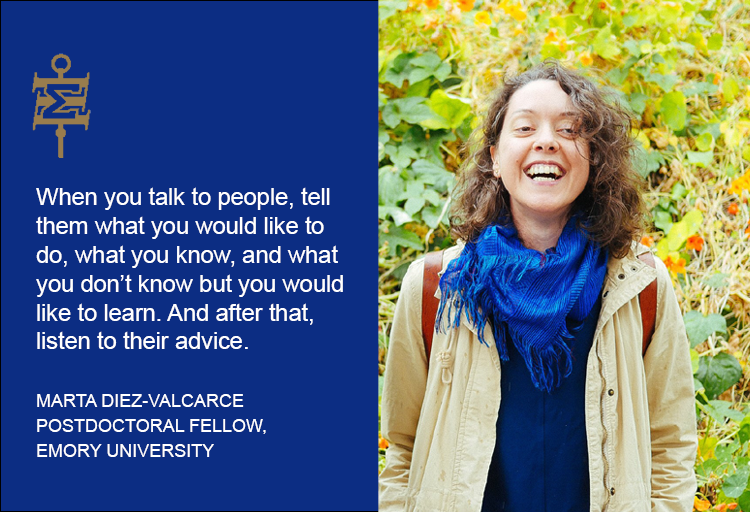
Current position
Postdoctoral Fellow at the Rollins School of Public Health, Emory University
Please describe your job.
I am a laboratorian working on viral gastroenteritis. My main research interests are studying the distribution and prevalence of virus gastroenteritis in different populations (mainly kids up to 5 years of age). The information we are gathering could:
- Improve the understanding of natural immune response to viral infections since birth
- Be used in the design, development, and implementation of vaccines for viral gastroenteritis
What are the top resources that have helped you in your career as a woman in STEM and why were they helpful?
PERSONAL RELATIONSHIPS. Network, meet people, reach out to people you admire (don’t be shy, most of the time people are happy to talk to other scientists who are genuinely interested in what they do). When you talk to people, tell them what you would like to do, what you know, and what you don’t know but you would like to learn (that has proved to me to very important). And after that, LISTEN to their advice (it sounds easier than it actually is, at least for me, but when you do…then the magic happens).
Kelly K. Falkner
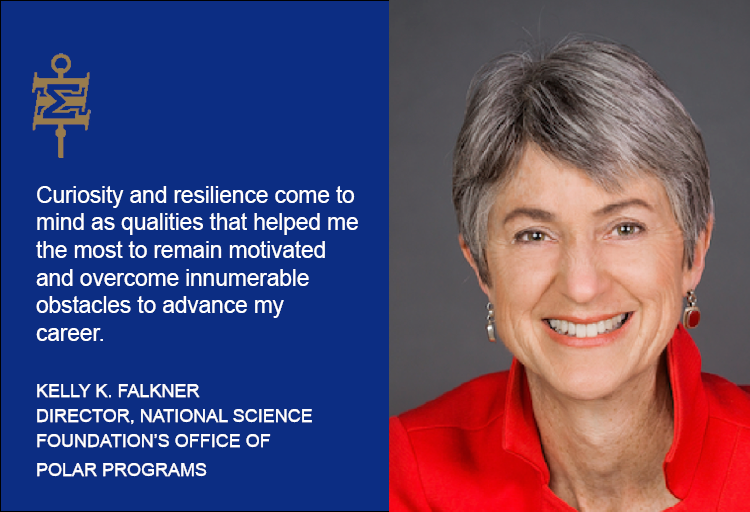
Current position
Director of the National Science Foundation’s Office of Polar Programs
Please describe your job.
I serve as director of the Office of Polar Programs (OPP), National Science Foundation (NSF) and so director of the U.S. Antarctic Program, which NSF manages on behalf of all the U.S. government in accordance with Presidential Memorandum 6626 and the terms of the Antarctic Treaty System. I am a member of the Senior Executive Service and currently oversee an annual budget of $600 million covering scientific research and logistics programs in both the Arctic and Antarctic. It is an exciting proposition to foster highest quality scientific merit review and pull all the diverse operational and cooperative pieces together necessary to sustain a world-leading polar research portfolio for the nation.
What are the top resources that have helped you in your career as a woman in STEM and why were they helpful?
“Resources” might not quite be the right word to express what has been most important to my career progression. Curiosity and resilience come to mind as qualities that helped me the most to remain motivated and overcome innumerable obstacles to advance my career as a woman in STEM.
I recommend that those who wish to pursue a career in STEM consciously cultivate curiosity for the fun and insights it generates. Surround yourself with people in schools, training programs, societies and other groups who pursue what makes them wonder and learn from them. Deliberately exercise curiosity so you don’t lose that ‘muscle’ we are all born with. The joy of scientific discovery and expanding knowledge rewards the curious.
While that joy may be at the core, it isn’t enough. You are going to need to draw on resilience; while it seems that all human beings long to belong, there will be times when you will feel like you don’t. Probe those feelings but don’t be overcome by them. If you feel the confidence slipping, pull out your resume and read it! Let your accomplishments speak to you; if you managed to get this far, you have what it takes to forge on.
Make it a point to pursue activities that fortify your resilience. For me that included taking regular breaks from STEM matters. The most important resources? Colleagues, friends and/or family who can help navigate the challenges as they inevitably emerge. Music, art, athletics, social gatherings, teaching others, volunteering; whatever it takes to keep your perspective healthy and balanced.
I applaud my fellow Sigma Xi members for pointing out extremely beneficial resources available to support people in STEM careers. I urge you to avail yourselves of them and may you remain curious and resilient in your personal STEM journey.
Ella A. Kasanga
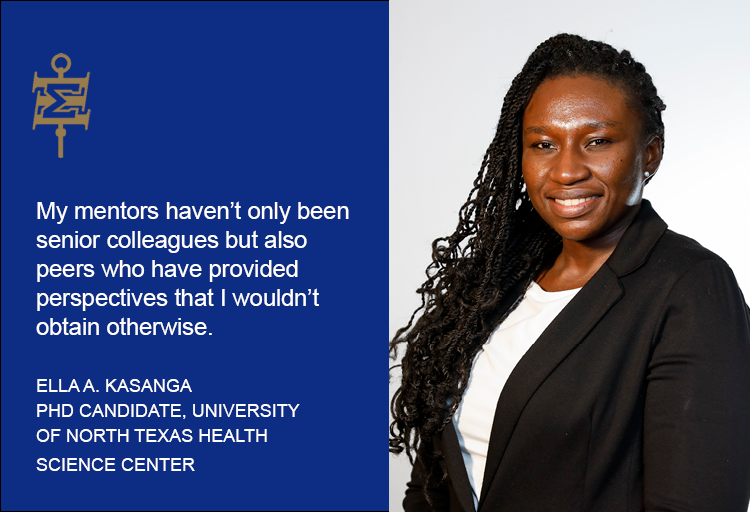
Current position
PhD Candidate at the University of North Texas Health Science Center
Please describe your area of study and research interests.
My area of study primarily focuses on identifying and understanding how motor impairment occurs in both aging and Parkinson’s disease. Additionally, my research includes identifying interventions, ie. lifestyle and medications, which may reduce the rate of locomotor dysfunction, as this condition takes a toll on both patients and caretakers. With the expected exponential increase in the aging population by the year 2030, the incidence of impaired movement initiation, with its associated consequences, is also expected to rise. Thus, research needs to be undertaken to determine what measures can be put in place to ensure that the elderly population live a healthy long life.
What are the top resources that have helped you in your career as a woman in STEM and why were they helpful?
Seeking advice from mentors is one resource that I have utilized throughout my undergraduate education as a pharmacy student to my graduate school education. I have garnered mentors who have provided advice and shared experiences which have guided me in my scientific career. My mentors haven’t only been senior colleagues but also peers who have provided perspectives that I wouldn’t obtain otherwise. The availability of mentors within STEM has been invaluable to my growth as a professional.
Apart from mentorship, attending conferences like the Sigma Xi Annual Meeting & Student Research Conference and the Society for Neuroscience (SfN) Annual Meeting is a resource that has proven very useful. The opportunity to interact with other researchers, exchange ideas, and form collaborations is a gift which shouldn’t be looked down upon especially in the era where collaborative science is gaining popularity. Most of these conferences also have specialized workshops which create an avenue to enhance one’s professional development. For instance at SfN, a special luncheon is organized for female scientists, creating a unique avenue to interact with both seasoned scientists and peers. This is an effective way of establishing one’s professional support system which is very important in every field.
Also, I have found the SfN Neuronline Platform very useful. This platform helps one expand their skills by providing scientific research, training, and professional development resources which may include videos, articles, interviews and virtual conferences. Having this diverse range of resources on one platform makes it very convenient for members to obtain much-needed information.
As a young woman who is gradually building her career in STEM, the experience can be quite overwhelming, however, I strongly believe that with the right resources and support system, a successful STEM career is definitely within reach.
Haixin Peng
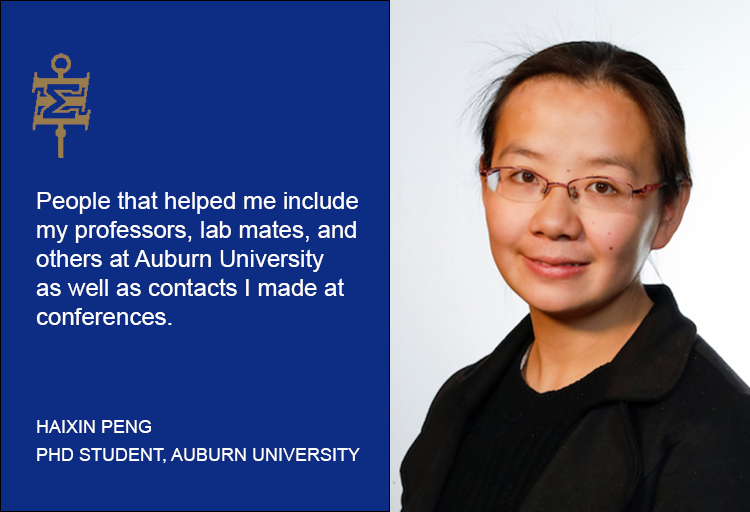
Current position
PhD student at Auburn University
Please describe your area of study and research interests.
I am pursuing a PhD at Auburn University, studying bioprocess engineering. My research focused on algae biofuel and food-production capability of processes. Microalgae are photosynthetic microorganisms with rapid growth and the potential for production of lipids, proteins, and carbohydrates. Our research team’s goal is to study the symbiotic interaction of algae and bacteria: 1) how bacteria regulates the algae growth in the application for waste remediation and water quality; 2) the development for algae high-value bioproduct applications such as omega-3 fatty acids, carotenoids, and polyphenols bioactive compounds.
What are the top resources that have helped you in your career as a woman in STEM and why were they helpful?
I am lucky to have access to so many resources that further my career as a woman in STEM. People that have helped me include my professors, lab mates, and others at Auburn University as well as contacts I made at conferences. I joined the Graduate Women in Science (GWIS) Auburn chapter, which has provided me support and advice from friends, peers, and staff mentors. I attended the 2019 Algae Biomass Summit, where I developed my research skills and enhanced my understanding of the scientific applications of algae. I also attended the Sigma Xi Annual Meeting and Student Research Conference, where people from diverse backgrounds gathered to learn together. I talked to many people both within and outside of my research area. The conversations I had with mentors there about my research and career goals helped me and encouraged me to pursue a future in this field.
Through all of these experiences, exposure to inspiring people has broadened my horizons, given me experience collaborating with diverse teams, taught me about various career possibilities, and helped me grow both personally and professionally. Besides talking to people, I gain perspective through reading books. Reading a good book is like making a good friend. In my spare time, I like reading biographies of remarkable women. My favorite book is the biography of Marie Curie, a good role model in my life and work.
Danielle Wood
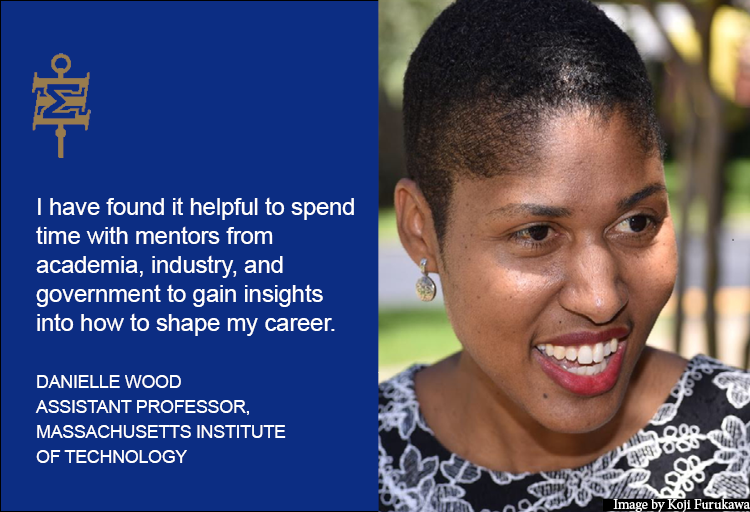
Current position
Assistant Professor of Media Arts and Sciences, Assistant Professor of Aeronautics and Astronautics, and Director of the Space Enabled Research Group at the Massachusetts Institute of Technology; MIT Faculty Contact for African and African Diaspora Studies; Visiting Associate Professor, Kyushu Institute of Technology (Japan); Sigma Xi Distinguished Lecturer
Please describe your job.
In 2018, I joined the faculty at MIT and founded the Space Enabled Research Group within the Media Lab, an interdisciplinary research center. The mission of the Space Enabled Research Group is to advance justice in Earth's complex systems using designs enabled by space. Our message is that six types of space technology are supporting societal needs, as defined by the United Nations Sustainable Development Goals. These six technologies include satellite earth observation, satellite communication, satellite positioning, microgravity research, technology transfer, and the inspiration we derive from space research and education.
While much good work has been done, barriers remain that limit the application of space technology as a tool for sustainable development. The Space Enabled Research Group works to increase the opportunities to apply space technology in support of the Sustainable Development Goals. Our research applies six methods, including design thinking, art, social science, complex systems, satellite engineering and data science.
We pursue our work by collaborating with development leaders who represent multilateral organizations, national and local governments, non-profits and entrepreneurial firms to identify opportunities to apply space technology in their work. We strive to enable a more just future in which every community and country can easily and affordably apply space-enabled technology to improve public services and solve local challenges. We also work to help improve the sustainability of activities in space by reducing the risk of space debris causing collisions that damage satellites. Finally, we think about future human activities in space when people will live in communities beyond Earth; we ask how we can create a foundation for just societies in space and on Earth.
What are the top resources that have helped you in your career as a woman in STEM and why were they helpful?
Throughout my career I have found it helpful to spend time with mentors from academia, industry, and government to gain insights into how to shape my career. When I was an undergraduate, spending time working in university research laboratories or government internships gave me valuable experience (see http://intern.nasa.gov/). I also participated in several international or national professional organizations as a volunteer, specifically the International Astronautical Federation (http://www.iafastro.org/) and the American Institute for Aeronautics and Astronautics (https://aiaa.org). As a graduate student I earned fellowships to support my education from NASA, the Department of Defense (NDSEG.asee.org) and the National Science Foundation (Graduate Research Fellowship Program). Each of these resources helped me find a path to select a research area and long-term career path focused on applying space technology to support sustainable development on earth and in space.
More from the Women in STEM project
2019
2018
2017
2016
2015
All years